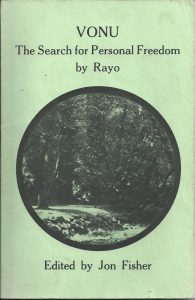The Mystery Man of the Libertarian Movement
By: R.W. Bradford
Note: The following is a mirror of a Retrospective published in the August 1987 edition of Liberty Magazine, discussing Rayo, otherwise known as Tom Marshall. Also, make sure to check out his book, Vonu: The Search for Personal Freedom, available in audiobook and PDF format through Liberty Under Attack.
 In February 1964, Tom Marshall began publication of Innovator, “a newsletter of applied philosophy.”
In February 1964, Tom Marshall began publication of Innovator, “a newsletter of applied philosophy.”
Each month, Innovator’s four pages of tiny type contained an astonishing array of ideas and information about freedom: its meaning, its implications, how it works, how to get it. Innovator was more than simply a monthly forum for the nascent libertarian movement, more than a calendar of news and events, more than a place for libertarians to strut their stuff: it was a lifeline to isolated libertarians.
And we were all isolated then. There was no libertarian movement: only isolated individuals who had rejected the statist world view. Most of those who were to become part of the libertarian movement were acting in isolation or small pockets within the left or right or the academy.
Many spent their intellectual energy defending libertarianism’s more extreme positions. “What! Do you actually mean that we should sell the Post Office? Then who’d deliver the mail?” Others who were to become libertarians accepted most libertarian ideas but feared the idea of total freedom, or feared the expression of that idea.
The dominant libertarian activity, it seemed, was apologizing for libertarianism. Innovator changed all that. I remember the first issue of Innovator I read. Its headline was “Sell The Roads!” It made its case in a logical and sensible way. It didn’t apologize for its “extremist” position; it held it high like a banner. It was at that moment that I first began to realize that the future of freedom did not lie in compromise or apology, it did not lie within the conservative movement. It lay in the proud assertion of our own libertarian ideas and arguments.
Innovator was the first modern libertarian periodical: it did more than simply record the birth of modem libertarianism; it midwifed it.
A fair amount of Innovator was Tom Marshall’s writing. He wrote a few articles under his own name and a variety of pseudonyms, but favored the pseudonym “El Ray.” Marshall chose this peculiar name, it is said, because it referred to “the ray” as in “the ray of light.” Many thought his name meant “the king”, as though it were a Spanish pun.
He eventually changed it to “Rayo.” Tom Marshall was always convinced of the merit of maintaining a low profile, warning his friends to keep his pseudonyms secret, maintaining a nondescript office, keeping his residence secret from movement friends.
By 1968, his interests were turning away from organized educational activity toward escaping from the control of the state. “Life in the interstices” had always been one of his favorite strategies, and he had always urged self-reliance in such practical forms as guns and alternative identification.
As the Vietnam War escalated, the civil rights and anti-war movements flourished and the world’s states responded by constantly increasing their political power and constantly building even more powerful engines of destruction, Tom Marshall grew more and more convinced that the world of organized society and government was the problem.
To him, the solution to the problem of government was simple: abandon it.
He chose the sparsely populated Siskiyou region of southern Oregon as his habitat. At first he lived in a camper-pickup truck combination with no permanent address, gradually learning wilderness skills and weaning himself and his “freemate” from the social world.
He called his way of living “vonu” (as in “VOluntary Not vUlnerable”). Always the logical engineer, he pursued his vonu freedom methodically. He researched and experimented, writing up his findings and quietly publishing them in his underground newsletter Vonu Life.
For a time, he also quietly campaigned for other libertarians to join him in his new way of life. He even offered a sort of “on-the-vonu” training program, complete with coded maps and secret rendezvous.
So far as is known, “vonuism” did not grow. His trainees returned to civilization, unwilling to abandon their Big Macs for pine needle sandwiches. As his survival skills increased, he moved deeper and deeper into the woods. And he got tired of publicizing vonu.
No one has heard from Tom Marshall since early 1974.
Some people speculate that he grew weary of his paranoid lifestyle and returned to straight society to live an “ordinary life.” Others speculate that his increasing alienation and desire for isolation led him deeper into the wilderness, where he died a cold death in the rains of the Siskiyou Mountains, miles from civilization.
But others—those who knew him most intimately—believe he succeeded in achieving vonu, that he continues to live today, deep in the mountains of Southern Oregon, living a fulfilling life as a hunter-gatherer, free at last of the oppression of the state.
A few hundred miles north of the Siskiyou National Forest where Tom Marshall was last seen, in a small town on the edge of another National Forest, the Sheriff spoke to a reporter from a big city newspaper.
Sheriff Robert Holder told the man from the Seattle Times that he plans to trade his police car for a four-wheel drive vehicle.
His county, it seems, contains some of the most inaccessible land in the West. “I’ve heard stories that we may have a subculture, clusters of people who live in a very primitive way in remote wooded parts,” he said. “But it’s hard to evaluate what’s really going on there.”
For more great content like this, please consider donating to Liberty Under Attack. Alternatively, sign up for a free trial through Audible, receive a free audiobook, and help support us in the process. Lastly, make sure to support LUA via Patreon.
[jetpack_subscription_form]



